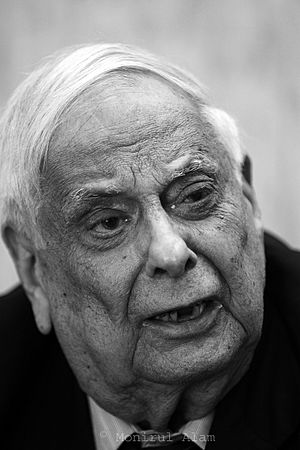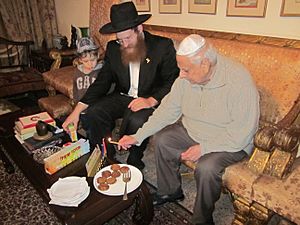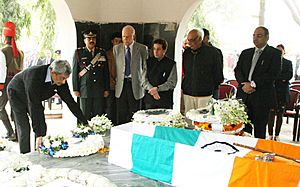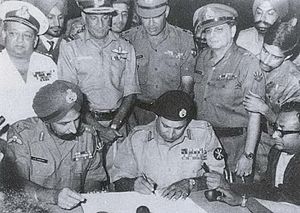J. F. R. Jacob facts for kids
Quick facts for kids
Jack Farj Rafael Jacob
PVSM
|
|
|---|---|
 |
|
| 24th Governor of Punjab | |
| In office 27 November 1999 – 8 May 2003 |
|
| Chief Minister | Parkash Singh Badal |
| Preceded by | B. K. N. Chhibber |
| Succeeded by | O. P. Verma |
| 9th Governor of Goa | |
| In office 19 April 1998 – 26 November 1999 |
|
| Chief Minister | Pratapsingh Rane (1998) Luizinho Faleiro (1998–1999) Francisco Sardinha (1999) |
| Preceded by | T. R. Satish Chandran |
| Succeeded by | Mohammed Fazal |
| Personal details | |
| Born |
Jack Farj Rafael Jacob
2 May 1921 Calcutta, Bengal Presidency, British India (Now, Kolkata, West Bengal, India) |
| Died | 13 January 2016 (aged 94) New Delhi, India |
| Awards | |
| Military career | |
| Allegiance | |
| Service/ |
|
| Years of service | 7 June 1942 – 31 July 1978 |
| Rank | |
| Service number | IC-470 |
| Commands held | XVI Corps 12 Infantry Division |
| Battles/wars | World War II Indo-Pakistan War of 1971 |
Lieutenant General Jack Farj Rafael Jacob, also known as JFR Jacob, was an important general officer in the Indian Army. He is best known for his key role in the Bangladesh Liberation War of 1971. At that time, Jacob was a major general and served as the chief of staff for the Indian Army's Eastern Command. During his 36 years in the army, Jacob also fought in World War II and the Indo-Pakistani War of 1965. After retiring from the military, he later became the governor of the Indian states of Goa and Punjab.
Contents
Early Life and Joining the Army
Jacob was born in Calcutta (which is now Kolkata) in 1921. His family was Baghdadi Jewish and originally came from Iraq. They had settled in Calcutta in the mid-1800s. His father, Elias Emanuel, was a rich businessman. When Jacob was nine, his father became sick, and Jacob was sent to a boarding school called Victoria Boys' School near Darjeeling. After that, he only went home for school holidays.
During World War II, Jacob heard terrible news about the Holocaust, where many European Jews were being killed. This motivated him to join the British Indian Army in 1942. His father did not want him to join. In 2010, Jacob said, "I am proud to be a Jew, but am Indian through and through."
Military Career Highlights
Starting in the Army
Jacob graduated from the Officers' Training School in 1942. He became a second lieutenant on June 7. His first posting was in northern Iraq, as there was a concern that German forces might try to take over the oil fields there.
In 1943, Jacob was moved to an artillery brigade that went to Tunisia. They were there to help the British Army fight against Field Marshal Erwin Rommel's forces. However, the enemy forces surrendered before Jacob's brigade arrived. From 1943 until the end of World War II, Jacob's unit fought in the Burma Campaign against Japan. After Japan was defeated, he was sent to Sumatra.
After World War II, Jacob went to special artillery schools in England and the United States. He learned about advanced artillery and missiles. When India became independent, he returned and joined the Indian Army.
After India's Independence
In 1951, Jacob was chosen to attend the Defence Services Staff College. In 1956, he became the first commanding officer of the 3 Field Regiment. In 1964, he took charge of an artillery brigade. During the Indo-Pakistani War of 1965, he led an Infantry Division in Rajasthan. During this time, Jacob wrote a manual for the Indian Army on how to fight in deserts.
In 1967, he was promoted to major general and given command of an infantry division. In 1969, General Sam Manekshaw appointed him as the chief of staff (COS) of the Eastern Command. His direct boss was Lieutenant General Jagjit Singh Aurora. Jacob was soon given the task of dealing with growing problems in Northeast India.
Role in the Bangladesh Liberation War
Jacob became very well-known for his work as chief of staff of the Eastern Command. This command played a huge part in defeating the Pakistan Army in East Pakistan during the 1971 Bangladesh Liberation War. Jacob received a special award for his efforts.
In March 1971, the Pakistan Army started "Operation Searchlight" to stop the Bengali nationalist movement in East Pakistan. This action caused over 10 million refugees to flee into India, which increased tensions between India and Pakistan. By the monsoon season, Jacob, as chief of staff, was asked to create plans in case of a war.
After talking with his senior officers, Jacob developed a plan for fighting Pakistan in the difficult, swampy lands of East Pakistan. An early plan from Manekshaw suggested capturing only parts of East Pakistan. Many Indian Army officers were worried about a full invasion because they feared the United Nations might demand an early ceasefire. They also worried about China and the difficulty of moving through the marshy land with three wide rivers.
Jacob disagreed with this cautious approach. His plan, called a "war of movement," aimed to take control of all of East Pakistan. Jacob believed that the capital, Dhaka, was the most important city. He felt that any successful campaign had to capture Dhaka. He knew that the Pakistani Army commander, A. A. K. Niazi, would strongly defend the towns. So, Jacob's plan was to avoid these towns, destroy Pakistan's communication systems, and use smaller routes to reach Dhaka quickly. The Eastern Command eventually approved Jacob's plan.
This strategy led to the capture of Dhaka. The Indian forces bypassed Pakistani strongholds, captured their communication centers, and destroyed their ability to command and control their troops. Jacob's campaign was planned to take three weeks, but it was completed in less than two weeks.
Jacob understood that a long war would not be good for India. On December 16, during a break in the fighting, Jacob asked for permission to visit Niazi to ask him to surrender. He flew to Dhaka and got an unconditional surrender from Niazi. Niazi later claimed Jacob blackmailed him by threatening to bomb Pakistani troops. General Jacob made Niazi surrender publicly at the Dhaka racecourse in front of the people of Dhaka.
The war was a big victory for India. Nearly ninety thousand Pakistani soldiers surrendered to the Indian Army, even though there were only about three thousand Indian soldiers right around Dhaka. A study by Pakistan's National Defence College said that "the credit really goes to Jacob's careful preparations in the Indian eastern command."
For his important role in the war, Jacob received the Param Vishisht Seva Medal (PVSM), which is given for outstanding service.
Later Military Career
On June 17, 1972, Jacob was promoted to lieutenant general. He was appointed as the General Officer Commanding of XVI Corps, a newly formed unit. His last job in the army was as the GOC-in-C of Eastern Command, which he held from 1974 until he retired on July 31, 1978. He served in the army for 36 years.
Life After the Army and Political Career

After leaving the army, Jacob started a business career. In the late 1990s, he joined the Bharatiya Janata Party, a political party, and became their security adviser.
From April 19, 1998, to November 26, 1999, he served as the Governor of Goa. During his time as Governor, he also acted as the administrator when the state government was unstable. He was known as a very effective administrator. He helped protect Goa's natural green areas by declaring Mhadei and Netravati as wildlife sanctuaries.
From November 27, 1999, to May 8, 2003, he served as the Governor of Punjab and the Administrator of Chandigarh. During this time, he successfully set up the IT Park in Chandigarh. He invited N. R. Narayana Murthy, the Chairman of Infosys, to open a development center there. After that, other IT companies also opened offices in the Chandigarh IT Park, creating more jobs in the city. He also came up with the idea for the Chandigarh War Memorial. Students from the Chandigarh College of Architecture designed it, and President A. P. J. Abdul Kalam opened it on August 17, 2006.
Jacob supported better relations between India and Israel. When the Bharatiya Janata Party became part of India's ruling government in 1998, one of their main goals was to improve relations with Israel. He supported India buying military equipment and technology from Israel. He was also positive about India's economic growth and the abilities of young Indians.
Death

On January 13, 2016, Jacob passed away at the Army Research and Referral Hospital in New Delhi due to pneumonia. He was buried the next day in Delhi's Jewish cemetery. India's defence minister, information minister, and foreign guests attended his funeral.
In April 2019, Israel honored Jacob with a special plaque on the Ammunition Hill Wall of Honour.
Major Publications
Jacob wrote these books:
- Surrender at Dacca: Birth of a Nation
- An Odyssey in War and Peace: An Autobiography
Honours and Awards
The Bangladesh government, in 2012, gave him the Friends of Liberation War Honour. This was in recognition of his important contribution to the creation of Bangladesh.


